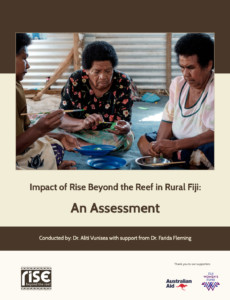Impact Assessment finds that 95% of women participating in the project gained more control over household resources
November 12, 2019
 In April of this year, Fund grantee Rise Beyond the Reef (RBTR) completed an Impact Assessment of its work in Fiji’s rural communities, and particularly how that work has affected and improved women’s lives.
In April of this year, Fund grantee Rise Beyond the Reef (RBTR) completed an Impact Assessment of its work in Fiji’s rural communities, and particularly how that work has affected and improved women’s lives.
A total of 126 women and eight men were interviewed over two weeks in 10 communities in Ba and Ra Provinces. The assessment completes RBTR’s household-level baseline studies it began in 2013 to assess local needs from a grass-roots perspective.
While the overarching goal of RBTR is to address gender inequalities through women’s economic empowerment, the goals of the impact study were as follows:
- To identify household gender roles and assess how much household responsibilities are shared.
- To measure economic, personal, and reproductive health decision-making.
- To verify the occurrences of gender-based violence, and to assess the quality of women’s and girls’ safety and protection.
- To analyse participation in village committees and meetings (Bose va Koro or village meetings, and Bose ni Vanua, traditional leaders’ community meeting), in religious and educational institutions, and at district and province levels.
- To ascertain changes in gender-based decision-making in the mataqali (clan) and in other community cultural spaces, and to document women’s widening spheres of influence in the soqosoqo (women’s tribal council).
Development projects like these can affect three levels (individual, household, and community) and may have both direct and indirect impacts on women’s economic empowerment. At the individual level, the report showed that 80% of women in the RBTR project communities participate in the handicraft projects. Women bring their existing skills, and in the process learn new skills and gain knowledge in new areas, such as marketing, meeting deadlines, and assessing supply and demand. The new skills and knowledge, along with increased earnings, build women’s confidence.
The assessment also found that in all RBTR projects, 95% of women participating gained more control over household resources. Greater economic independence allows women to purchase items for themselves, to invest in their children’s education, and to invest or save their money. And when women are able to invest in their children’s education, future generations of women are empowered because more girls are able to attend school.
A four-page summary of the Impact Assessment can be found here: https://bit.ly/2M05FFw
Recent Whats New
Centre helps women build confidence, improve skill set
October 17 2024
A journey to self-care: My retreat experience in Bodrum, Turkey
October 15 2024
Skills training empowers women on island
October 4 2024
Women’s network launches strategic plan, hosts craft show
September 25 2024
